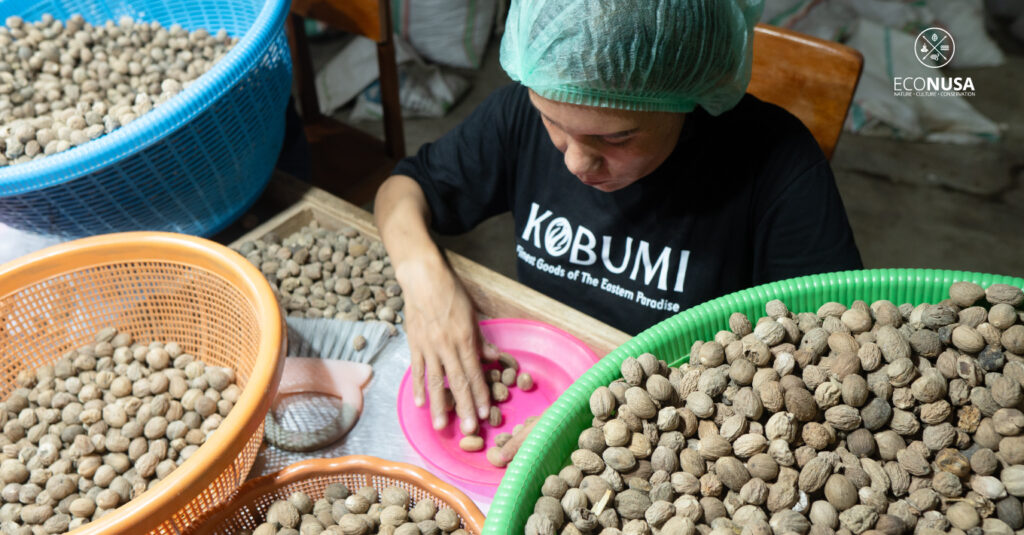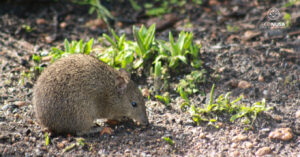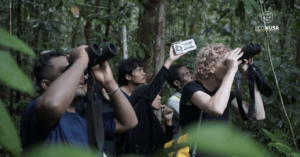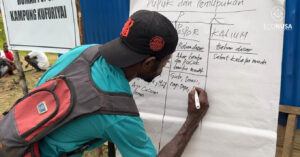
Nutmeg has long been one of Indonesia’s favorite spice commodities, especially in Papua and the Maluku Islands. These two regions are known as the largest nutmeg centers in the archipelago. The distinctive aroma and taste of nutmeg have certainly been a special attraction for foreign countries.
“I have been growing nutmeg since I was in junior high school, in my parents’ garden which has been around since the VoC era,” said Khairun Abujali, one of the nutmeg farmers in Banda when interviewed by telephone (15/9). Khairun mentioned that the majority of people in the Banda Islands have been nutmeg farmers for generations.
Read also: Vanilla, A Source Hope for Improving Communities Income
Nutmeg is among the plants extensively cultivated within community forests through agroforestry methods, and it is an integral component of social forestry initiatives. Social forestry, in essence, represents a sustainable forest management system carried out within state forest areas or customary forests by local communities and customary law communities. It serves as a harmonious approach to enhance well-being, restore ecological equilibrium, and uphold established social structures. To put it differently, besides serving as a source of income for local farmers, the presence of nutmeg farms also contributes to maintaining regional ecosystem stability and preserving the socio-cultural dynamics deeply rooted in the Maluku Islands since time immemorial.
Khairun mentioned, “The income derived from nutmeg harvesting goes towards purchasing daily necessities, to pay children’s school fees, and to do minor house maintenance.” There are two significant nutmeg harvests that occur annually, marked by substantial yields. During these major harvesting periods, local farmers can potentially earn up to 25 million rupiah per person, depending on the size of their farm. This income from nutmeg cultivation often paves the way for them to realize their dream of embarking on a pilgrimage to Mecca and performing the Hajj.
From a single nutmeg, all its parts, including the fruit, mace (nutmeg flower covering), and seed, can be utilized by farmers as commodities. However, the majority of nutmeg farmers in the Maluku Islands primarily focus on harvesting and selling the mace (fuli) and the seeds. Saprudin Mahu or Yudi, one of the nutmeg farmers from Jasira Village in Seith, Central Maluku, explains that the price for one kilogram of nutmeg seeds ranges from Rp 92,000 to Rp 95,000, depending on its quality. Meanwhile, one kilogram of mace (fuli) is priced at Rp 215,000 per kilogram. These prices are typically determined by the middlemen or collectors in their area.
Read also: Between the Shrimp Summoning Ritual and the Fgan Fen Sisi Cooperative
“Having EcoNusa and KOBUMI coming to this area has benefited us. KOBUMI buys nutmeg based on the latest price range and actual field conditions, so we can get a fair price,” said Yudi. He explained before they collaborated with KOBUMI, local collectors often bought their nutmeg at prices randomly decided by collectors. He said local farmers did not have other options to distribute their nutmeg, which resulted in unfair selling prices.
“To ensure the local commodity potential maintains global competitiveness and contributes to the well-being of indigenous and local communities, EcoNusa’s role in supporting the enhancement of the quality of products marketed by KOBUMI is by providing assistance to nutmeg farmers in the Maluku Islands, particularly in the Banda and Tehoru Islands since 2021. One of these initiatives includes the establishment of nutmeg drying facilities for farmers in various regions of Banda and East Seram. The support aims that post-harvest processing and treatment of nutmeg seeds will align with the standards demanded by Asian and European markets, thereby increasing the commodity’s market value,” stated Lanny Losung, Managing Director of KOBUMI.
Read also: A Travel Note: Attending Molo, A Traditional Fishing Method of Moi Kelim Tribe
In addition to promoting quality-assured production through training and the provision of drying facilities, opening market opportunities for local flagship commodities is also crucial to support a thriving economy. Therefore, EcoNusa Foundation, in collaboration with KOBUMI, is making efforts to create various opportunities by introducing several outstanding local commodities from Eastern Indonesia, including nutmeg from the Maluku Islands. The goal is to enable local farmers to reach both local and international markets with their natural produce, thus enhancing the economy. This initiative also aims to introduce Indonesia’s exceptional products, particularly those originating from Papua and the Maluku Islands, to a global audience, fostering greater awareness worldwide.
Furthermore, the establishment of community cooperatives is encouraged to strengthen community-based economic self-sufficiency in the Maluku Islands region. Two cooperatives that have been assisted in their establishment are the Banda Neira Mandiri Cooperative and the Saoli Rempah Binaya Cooperative. It is hoped that both of these cooperatives can serve as community-owned enterprises capable of collecting and distributing various flagship commodities from the Maluku Islands region, including nutmeg.
Read also: Lingkar Jerat Papua Cooperative is Ready to Produce Quality Wild Boar Sausages
“The establishment of these cooperatives aims to enhance MSMEs and improve the economy of local nutmeg farmers in the Banda Islands,” explained Dirman Sampulawa, Chair of the Banda Neira Mandiri Cooperative. Dirman also mentioned that in the future the Banda Neira Mandiri Cooperative will provide regular capacity building and outreach related to post-harvest nutmeg processing with the ultimate goal of making the Banda Islands a region known for producing high-quality nutmeg.
The nutmeg harvest from farmers in the Maluku Islands, specifically, those graded as AB and SS, produced during the support period, have met international market standards. Nutmeg with AB quality (grade 1) signifies perfectly round seeds without wrinkles, cracks, or mold. Meanwhile, SS quality nutmeg (grade 2) refers to nutmeg seeds that are free from cracks, holes, or mold.
Together with cooperatives and in collaboration with KOBUMI, EcoNusa dispersed the agroforestry nutmeg from local farmers in Maluku islands to the Asian market. A total of 17 tons of nutmeg originating from various parts of Maluku such as the Banda Islands, Tehoru in West Seram, Bula in East Seram, Namlea Island, Buru Island, Saparua Island, and Lehitu Island were shipped to Surabaya (11/9) to then be distributed to the Chinese market.
Read also: The Story of Cacao Farmers in Papua: from being Successful to Now being Struggle
“This is a commitment from EcoNusa that collaborates with KOBUMI as a social eco enterprise, to strengthen the local economy. The business model promoted by KOBUMI is expected to bring economic improvements to indigenous and local communities through community-based cooperatives. This business model focuses on developing added value and commodity quality, optimizing the supply chain, and wider market access. By involving cooperatives, it is hoped that indigenous and local communities can have a greater role in production and distribution management so they can increase their income and the welfare of cooperatives in a sustainable manner,” Lanny concluded.
Editor: Swinny Adestika




